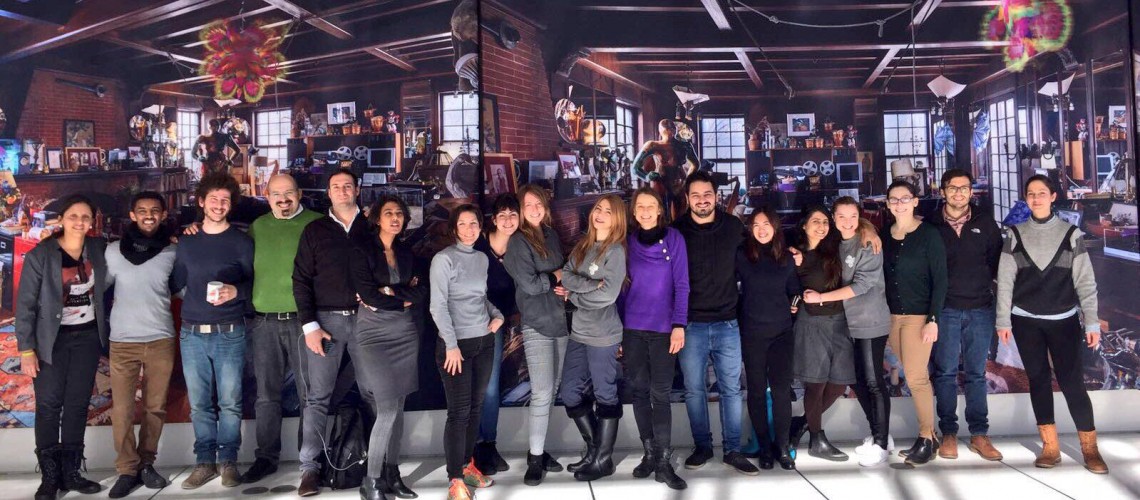
Taking off from the Italian Food Valley of Reggio Emilia, with the first leg in the Netherlands (Amsterdam and Maastricht), the Food Innovation Global Mission (FIGM) landed on the American East Coast, exploring the cities of Boston and New York. Opening the doors to a fascinating journey through food and innovation in the United States is the city of Boston, in particular the prestigious university Massachusetts Institute of Technology (MIT), a center of excellence well-recognized around the globe. It was an unique occasion to deepen the research themes that frame the tour: food heroes, food icons and food rituals. The delegation was greeted by an official visit from Italian consul Nicola De Santis, where a toast with Italian wine from Cantine Riunite was made, one of the supporting partners of the Mission and at the center of one of the Mission’s research projects regarding future trends in wine. Here the students met Kirsten Mobillia, who shared her startup project of urban gardens and Randy Bailey, a recruiter from Wal-Mart.
Boston, the first city on the East Coast which hosted the students, showed itself to be a territory rich in the blending of flavor and tradition. Among the icons of food in Boston is the celebrated lobster, served with melted butter or in a bun, along with oysters, a gourmet speciality that the FIP students learned to open and judge by variety and quality at a demonstration hosted by Eataly, itself a reference point for good Italian food abroad, thanks to the guide Serena Bronda, manager of communications for all things Made in Italy. And of course there were surprises, like handmade taralli that even passed the taste test of Puglia-born Nicola Difino, ambassador of the Future Food Institute and professional chef. The first day ended with an unforgettable dinner at Legal Sea Foods where the famous New England crab soup was served, a dish often served at presidential ceremonies starting from the time of Ronald Reagan.
Food, the driving engine of the combination between tradition and culture, was the absolute star of the first days in the city. Boston is an elegant and fascinating city with many “mandatory” iconic places: from the Harvard campus to the splendid Boston Public Library, to the harbor, and from Backbay to Fenway Park, a visit to a rooftop garden paired with a walk along the Charles river.
It wasn’t just tasting and typical local products, but also meetings with innovative and successful companies like Crema Caffè and Barrington Coffee Roasting Co, where Harvard students seek out the best coffee blends in the world and where organic coffee is served in support of local farming projects in India, Bali, and Africa. Following, a visit to Clover Food Lab, a chain of food trucks founded by Ayr Muri, a graduate in Material Science from Harvard and in Business Administration from MIT, that offers a simple menu changing each day based on seasonal products produced by local farms.
Boston, as a university city with a global reputation, can count on an ever-increasing number of food heroes that make it a center of excellence in research and innovation, like the young, but already famous people that the students were able to meet during their visit to the MIT Medialab. “My research focuses on the development of creative learning for young kids—to encourage learning through doing,” says Carmelo Presicce, a researcher at the Lifelong Kindergarten of Massachusetts Institute of Technology who was raised in Bologna but American by adoption. “How to adapt this new way of teaching to the world of food? Thanks to experimentation. The kitchen should be a place to learn from mistakes, because if we follow the recipes already made by someone else we will never taste something truly new.” Erin Baumgartner, a young researcher at the Senseable City, a center of studies founded by Carlo Ratti with MIT, is also trying to understand how to learn from mistakes to build the cities of the future.
Finally, collaboration and innovation are at the center of another project, the Food + Future coLAB, a space where different companies specializing in design and the shopping experience like Ideo and Target work together with MIT to create the tools needed by businesses to address the great challenges of the future of food. In this space scientific director Matteo Vignoli of the Food Innovation Program presented the Master program and was followed by a speech from Connor Russo of Kitchin, an app that encourages anyone, anywhere, to cook. In the evening part of the team participated in the panel “The Power of Food as an Educational Instrument” in the artistic space Le Laboratoire with speakers including Ioannis Miaoulis from the Museum of Science, Emma Boast from the Museum of Food and Drink NY, Molly Birnbaum of America’s Test Kitchen and Ben Leddy.
Follow this amazing lifetime experience “live” on Facebook, Twitter, LinkedIn, YouTube and Instagram using the hashtag #FIGM17
© 2015 Food Innovation Master Degree | © 2014 FUTURE FOOD INSTITUTE
